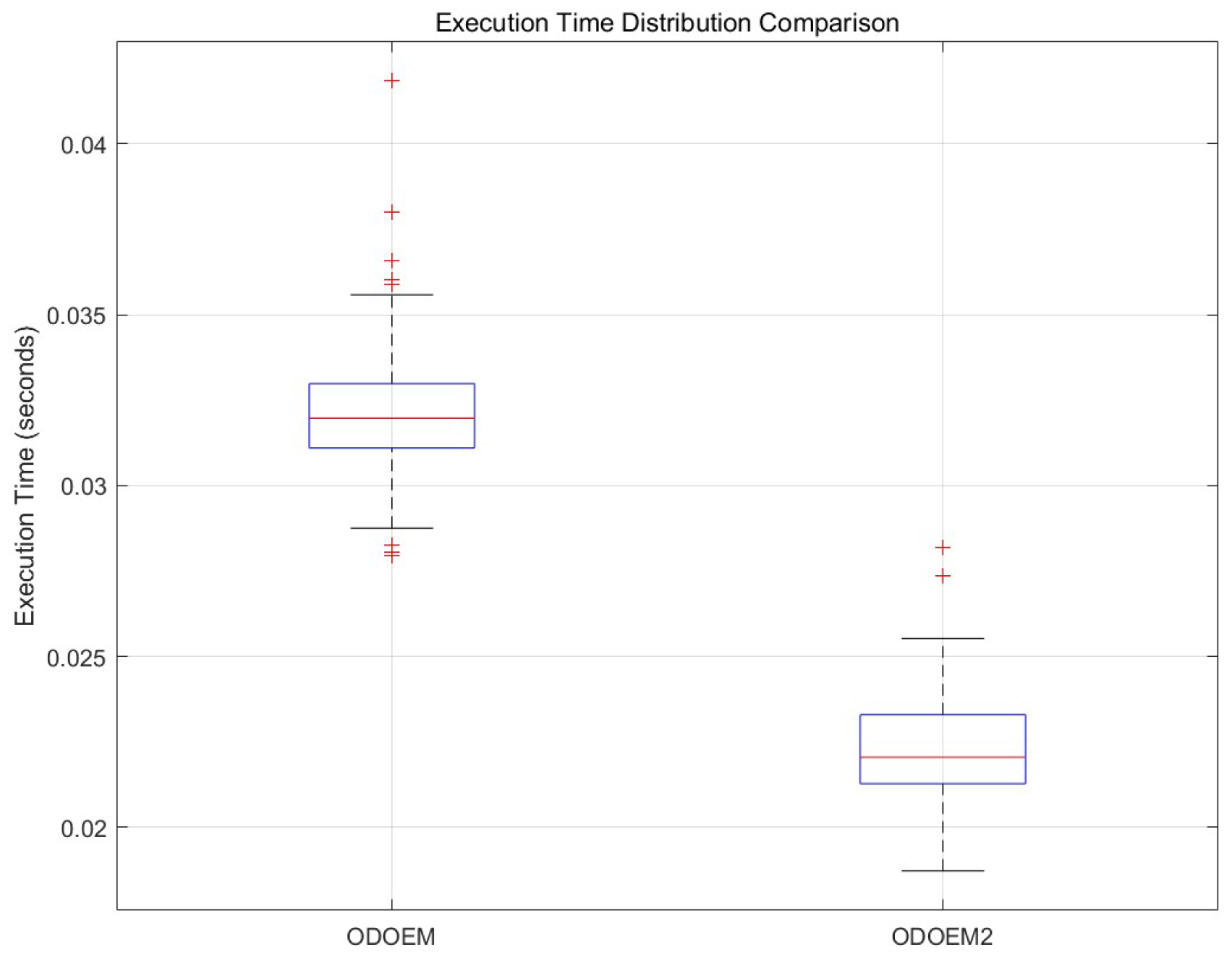An Equivalence Theorem and A Sequential Algorithm for A-Optimal Experimental Designs on Manifolds
Abstract
1. Introduction
2. Preliminaries and Literature Review
2.1. Classical Optimal Experimental Design on Euclidean Space
2.2. Manifold Learning and Manifold Regularization Model
3. Main Results
3.1. The A-Optimality Criterion
3.2. Equivalence Theorem for A-Optimal Designs on Manifolds
- (1)
- The experimental design is A-optimal under the LapRLS model (4), i.e., minimizes ;
- (2)
- The experimental design minimizes
- (3)
- ;
3.3. Sequential Algorithm with Finite Candidate Points
| Algorithm 1 ODOEM with discrete candidate points under the D-optimality criterion. |
|
| Algorithm 2 ODOEM2 with discrete candidate points under the A-optimality criterion. |
|
4. Simulation Study
4.1. Synthetic Manifold Datasets
4.2. Real Dataset: Columbia Object Image Library
5. Conclusions
6. Discussion
Supplementary Materials
Author Contributions
Funding
Data Availability Statement
Conflicts of Interest
References
- Kiefer, J.; Wolfowitz, J. The Equivalence of Two Extremum Problems. Can. J. Math. 1960, 12, 363–366. [Google Scholar] [CrossRef]
- Fedorov, V.V. Design of Experiments for Linear Optimality Criteria. Theory Probab. Its Appl. 1971, 16, 189–195. [Google Scholar] [CrossRef]
- Silvey, S.D. Optimal Design; Chapman and Hall: London, UK, 1980. [Google Scholar]
- Pukelsheim, F. Optimal Design of Experiments; Society for Industrial and Applied Mathematics: Philadelphia, PA, USA, 2006. [Google Scholar]
- Roweis, S.T.; Saul, L.K. Nonlinear Dimensionality Reduction by Locally Linear Embedding. Science 2000, 290, 2323–2326. [Google Scholar] [CrossRef] [PubMed]
- Tenenbaum, J.B.; de Silva, V.; Langford, J.C. A Global Geometric Framework for Nonlinear Dimensionality Reduction. Science 2000, 290, 2319–2323. [Google Scholar] [CrossRef] [PubMed]
- Donoho, D.; Grimes, C. Hessian Eigenmaps: Locally Linear Embedding Techniques for High Dimensional Data. Proc. Natl. Acad. Sci. USA 2003, 100, 5591–5596. [Google Scholar] [CrossRef] [PubMed]
- Coifman, R.; Lafon, S.; Lee, A.; Maggioni, M.; Nadler, B.; Warner, F.; Zuker, S. Geometric Diffusions as a Tool for Harmonic Analysis and Structure Definition of Data: Diffusion Maps. Proc. Natl. Acad. Sci. USA 2005, 102, 7426–7431. [Google Scholar] [CrossRef] [PubMed]
- Belkin, M.; Niyogi, P.; Sindhwani, V. Manifold Regularization: A Geometric Framework for Learning from Labeled and Unlabeled Examples. J. Mach. Learn. Res. 2006, 7, 2399–2434. [Google Scholar]
- Meilă, M.; Zhang, H. Manifold Learning: What, How, and Why. Annu. Rev. Stat. Its Appl. 2024, 11, 393–417. [Google Scholar] [CrossRef]
- He, X. Laplacian Regularized d-optimal Design for Active Learning and its Application to Image Retrieval. IEEE Trans. Image Process. 2010, 19, 254–263. [Google Scholar] [PubMed]
- Chen, C.; Chen, Z.; Bu, J.; Wang, C.; Zhang, L.; Zhang, C. G-optimal Design with Laplacian Regularization. In Proceedings of the Twenty-Fourth AAAI Conference on Artificial Intelligence, Atlanta, GA, USA, 11–15 July 2010; Volume 1, pp. 413–418. [Google Scholar]
- Alaeddini, A.; Craft, E.; Meka, R.; Martinez, S. Sequential Laplacian Regularized V-optimal Design of Experiments for Response Surface Modeling of Expensive Tests: An Application in Wind Tunnel Testing. IISE Trans. 2019, 51, 559–576. [Google Scholar] [CrossRef]
- Li, H.; Del Castillo, E. Optimal Design of Experiments on Riemannian Manifolds. J. Am. Stat. Assoc. 2024, 119, 875–886. [Google Scholar] [CrossRef]
- Jones, B.; Allen-Moyer, K.; Goos, P. A-Optimal versus D-Optimal Design of Screening Experiments. J. Qual. Technol. 2020, 53, 369–382. [Google Scholar] [CrossRef]
- Stallrich, J.; Allen-Moyer, K.; Jones, B. D- and A-Optimal Screening Designs. Technometrics 2023, 65, 492–501. [Google Scholar] [CrossRef]
- Domagni, F.K.; Hedayat, A.S.; Sinha, B.K. D-optimal saturated designs for main effects and interactions in 2k-factorial experiments. Stat. Theory Relat. Fields 2024, 8, 186–194. [Google Scholar] [CrossRef]
- Belkin, M. Problems of Learning on Manifolds. Ph.D. Thesis, The University of Chicago, Chicago, IL, USA, 2003. [Google Scholar]
- Schölkopf, B.; Smola, A.J. Learning with Kernels: Support Vector Machines, Regularization, Optimization, and Beyond; MIT Press: Cambridge, MA, USA, 2001. [Google Scholar]
- Jayasumana, S.; Hartley, R.; Salzmann, M.; Li, H.; Harandi, M. Kernel Methods on Riemannian Manifolds with Gaussian RBF Kernels. IEEE Trans. Pattern Anal. Mach. Intell. 2015, 37, 2464–2477. [Google Scholar] [CrossRef] [PubMed]
- Zhou, Z.-H. Machine Learning; Springer: Berlin/Heidelberg, Germany, 2021. [Google Scholar]
- Singh, V.P.; Bokam, J.K.; Singh, S.P. Best-case, worst-case and mean integral-square-errors for reduction of continuous interval systems. Int. J. Artif. Intell. Pattern Recognit. 2020, 17, 17–28. [Google Scholar] [CrossRef]





Disclaimer/Publisher’s Note: The statements, opinions and data contained in all publications are solely those of the individual author(s) and contributor(s) and not of MDPI and/or the editor(s). MDPI and/or the editor(s) disclaim responsibility for any injury to people or property resulting from any ideas, methods, instructions or products referred to in the content. |
© 2025 by the authors. Licensee MDPI, Basel, Switzerland. This article is an open access article distributed under the terms and conditions of the Creative Commons Attribution (CC BY) license (https://creativecommons.org/licenses/by/4.0/).
Share and Cite
Zhang, J.; Wang, Y. An Equivalence Theorem and A Sequential Algorithm for A-Optimal Experimental Designs on Manifolds. Axioms 2025, 14, 436. https://doi.org/10.3390/axioms14060436
Zhang J, Wang Y. An Equivalence Theorem and A Sequential Algorithm for A-Optimal Experimental Designs on Manifolds. Axioms. 2025; 14(6):436. https://doi.org/10.3390/axioms14060436
Chicago/Turabian StyleZhang, Jingwen, and Yaping Wang. 2025. "An Equivalence Theorem and A Sequential Algorithm for A-Optimal Experimental Designs on Manifolds" Axioms 14, no. 6: 436. https://doi.org/10.3390/axioms14060436
APA StyleZhang, J., & Wang, Y. (2025). An Equivalence Theorem and A Sequential Algorithm for A-Optimal Experimental Designs on Manifolds. Axioms, 14(6), 436. https://doi.org/10.3390/axioms14060436




